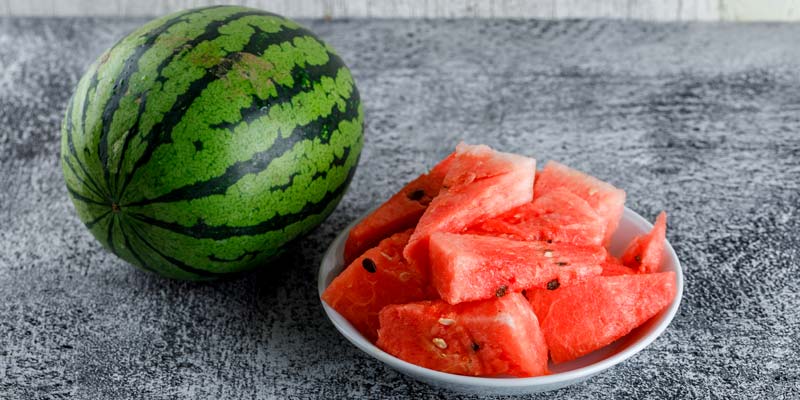When it comes to refreshing summer treats, few things beat sinking your teeth into a juicy slice of watermelon. This delectable fruit not only quenches your thirst but also satisfies your sweet cravings. But have you ever wondered about the carb content lurking beneath its succulent flesh? Let’s delve into the juicy details of carbs in watermelon and uncover the facts.
What Are Carbs, Anyway?
Before we dive into the specifics of watermelon carbs, let’s brush up on our carb knowledge. Carbohydrates, or carbs, are one of the three macronutrients essential for a balanced diet, alongside protein and fat. They serve as the primary source of energy for our bodies, fueling various bodily functions and activities.
Watermelon Keto

The ketogenic, or keto, diet involves strict control over carbohydrate intake, aiming for very low levels. Those on this diet typically limit themselves to under 50 grams of carbohydrates daily.
Watermelon is among the fruits suitable for a keto diet. It’s high in water content and low in carbohydrates compared to many other fruits. One cup of diced watermelon contains approximately 11.5 grams of net carbs (total carbs minus fiber), with 0.6 grams of fiber per serving.
Incorporating watermelon into your keto regimen can be beneficial. It not only offers hydration but also a range of vitamins and minerals, including antioxidants like vitamin C and lycopene, as well as minerals such as potassium and even copper.
Are Watermelons High in Carbs?
Contrary to popular belief, watermelon is relatively low in carbs compared to other fruits. While it’s true that watermelon contains natural sugars, its overall carb content remains modest. A typical serving of watermelon, around 1 cup diced, contains approximately 11 grams of carbs.
Digging Deeper: Understanding Watermelon’s Carb Profile
The majority of carbs in watermelon come from sugars, primarily fructose and glucose. These naturally occurring sugars give watermelon its signature sweetness. However, watermelon also boasts a high water content, making it a hydrating and refreshing choice, especially during hot summer days.
The Glycemic Index (GI) of Watermelon
One factor to consider when assessing the impact of carbs on blood sugar levels is the glycemic index (GI). The GI measures how quickly a particular food raises blood sugar levels after consumption. Despite its sweetness, watermelon has a relatively low GI, meaning it has a minimal effect on blood sugar levels. This makes it a favorable option for individuals monitoring their blood sugar levels, such as those with diabetes.
Health Benefits of Watermelon
While carbs are an important aspect to consider, watermelon offers a plethora of health benefits beyond its carb content. Rich in essential vitamins, minerals, and antioxidants, watermelon promotes overall health and well-being. It’s packed with vitamin C, vitamin A, potassium, and lycopene, a powerful antioxidant linked to various health benefits, including heart health and cancer prevention.
Watermelons and their juice are associated with numerous health advantages.
- Lower Blood Pressure
- Reduced Insulin Resistance
- Reduced Muscle Soreness After Exercise
Nutrition Information
Watermelon is primarily composed of water (91%) and carbohydrates (7.5%). It contains minimal protein and fat, making it very low in calories.
In a 2/3 cup (100 grams) serving of raw watermelon, you’ll find:
- Calories: 30
- Water: 91%
- Protein: 0.6 grams
- Carbohydrates: 7.6 grams
- Sugar: 6.2 grams
- Fiber: 0.4 grams
- Fat: 0.2 grams
Carbohydrates
Each cup (152 grams) of watermelon contains about 12 grams of carbohydrates.
These carbs mainly consist of simple sugars like glucose, fructose, and sucrose, with a small amount of fiber.
Watermelon’s glycemic index (GI), which measures how quickly foods elevate blood sugar levels after consumption, ranges from 72 to 80, indicating a high GI value.
Incorporating Watermelon Into Your Diet
Now that we’ve established that watermelon is a carb-friendly fruit, how can you incorporate it into your diet? From enjoying it as a refreshing snack to incorporating it into salads, smoothies, and desserts, the possibilities are endless. Get creative and explore different ways to savor the deliciousness of watermelon while reaping its nutritional benefits.
Conclusion
In conclusion, watermelon proves to be a carb-friendly fruit that can be enjoyed as part of a balanced diet. Despite its sweetness, its modest carb content and low glycemic index make it a suitable choice for those mindful of their carb intake. So, the next time you indulge in a slice of juicy watermelon, relish in its refreshing taste knowing that you’re nourishing your body with a wholesome treat.
FAQs
Q1. Is watermelon OK on a low-carb diet?
When comparing fruits, those with high water or fiber content typically have fewer carbs. Watermelon stands out as the lowest-carb fruit, containing 92% water and just 7.5 carbs per 100 grams. Additionally, it’s rich in vitamins A and C, making it a delightful and nutritious summer snack.
Q2. How many carbs are in 1 cup of fresh watermelon?
In terms of carbohydrates, a cup of watermelon weighing 152 grams contains about 12 grams. These carbs mainly consist of simple sugars like glucose, fructose, and sucrose. Watermelon also offers a modest amount of fiber.
Q3. Can diabetic patients eat watermelon?
Watermelon can be enjoyed in moderation by individuals with diabetes. It’s advisable to pair watermelon and other high glycemic index fruits with foods rich in beneficial fats, fiber, and protein for balanced nutrition.
Q4. Is watermelon carb-heavy?
In contrast to other fruit varieties, watermelon is comparatively low in carbohydrates. Specifically, a cup (152 grams) of diced watermelon contains approximately 11.5 grams of carbs and 0.5 grams of fiber, resulting in around 11 grams of net carbs.

